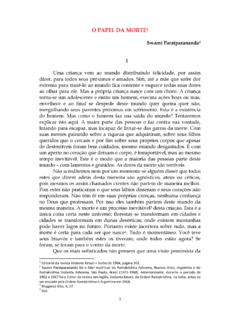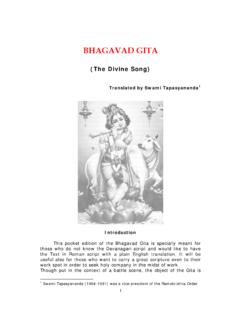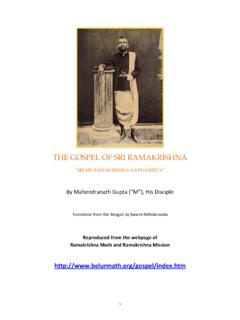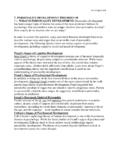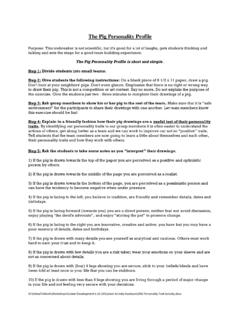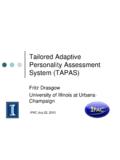Transcription of Personality - Ensinamentos Sagrados da Vedanta
1 Personality DEVELOPMENT. Swami Vivekananda ( PUBLICATION DEPARTMENT ). 5 DEHI ENTALLY ROAD KOLKATA 700 014. Published by Swami Bodhasarananda Adhyaksha, Advaita Ashrama Mayavati, Champawat, Uttarakhand from its Publication Department, Kolkata Email: Website: All Rights Reserved First Edition, December 1999. Second Edition, November 2001. Twenty-first Impression, July 2009. 21M2C. ISBN 978-81-7505-224-6. Printed in India at Trio Process Kolkata 700 014. CONTENTS. Publisher's Note 5. Introduction 7. Personality Development It Is Personality That Matters 22. Laws of Personality Development 26. Different Layers of Personality 30. Man Is Divine 34. Pleasure Is Not the Goal 36. How to Change Our Character? 39. Influence of Thought 45. Control Your Negative Emotions 49.
2 Change Yourself First 52. Take the Whole Responsibility on Yourself 55. How to Work? 60. Work Like a Master 68. 4 CONTENTS. Doing Good to This World 71. Unselfishness Will Bring Success 76. It Is Love That Pays 79. Weakness Is Death 83. Be Brave 89. Heroism 91. Faith in Oneself 95. Imitation Is Bad 98. What Is Ethics? 101. Hold On to the Ideal 104. The Power of Concentration 109. Develop the Sense of Equality 114. Be Free 116. March On! 121. References 124. PUBLISHER'S NOTE. The development of one's Personality , done in the right manner, is a challenging and rewarding task for every individual, particularly for the energetic youth who can gain much from it. It is challenging in that it demands hard, methodical labour, perse- verance, and careful attention.
3 And it is rewarding since no effort in this direction goes in vain. In fact, every effort brings success and satisfaction proportionate to the attempt. Moreover, it is every person's duty to work towards it, since Personality de- velopment is necessary for success in any field. In the writings, talks, and lectures of Swami Vivekananda, constructive ideas relating to Personality development are 6 PUBLISHER'S NOTE. profusely scattered. After culling those ideas systematically from The Complete Works of Swami Vivekananda, published by us, a compilation entitled Personality Development was published by Sri Ramakrishna Ashrama, Mysore, in December 1999. The booklet included an illuminating introduction, for which we owe our grateful thanks to its writer. We now have great pleasure in reprinting this book hoping that the readers, particularly the younger generation, will be greatly benefited in their efforts towards Personality development.
4 Kolkata Publisher August 23, 2001. INTRODUCTION. What Is Personality ? A CCORDING TO THE Cambridge Inter- national Dictionary of English, your Personality is the type of person you are, which is shown by the way you behave, feel and think.' Personality , according to the Longman Dictionary of Contemporary English, is the 'whole nature or character of a person.'. How a person behaves, feels and thinks, how he conducts himself in a given set of circumstances is largely determined by the state of his mind. Mere external appearance or a person's speech or mannerisms are only fringes of one's Personality . They do not 8 Personality DEVELOPMENT. reflect the real Personality . Personality development in the real sense refers to deeper levels of a person. So a study of our Personality should start from a clear grasp of the nature of our mind, and how it functions.
5 Necessity to know our mind : We intend to do many things make resolutions to cultivate good habits, to kick certain bad habits, to study with concen- tration, to do something with a con- centrated mind. Very often our mind rebels, forcing us to beat a retreat from our efforts at implementing our resolutions. A book is open before us, and our eyes are open. But the mind has started wandering, thinking about some past events or some future plans. The same thing happens when we sit for a few minutes trying to pray or think of a divine name or form. Says Swami Vivekananda: 'Free! We who cannot for a moment govern our own minds, nay, cannot hold our minds on a subject, focus it on a point to the exclusion of everything INTRODUCTION 9. else for a moment! Yet we call ourselves free.
6 Think of it!1. According to the Bhagavad Gita, the undisciplined mind acts as our enemy, whereas a trained mind acts as our So we need to have a clear idea of the mechanism of our mind. Can we train it to obey us, to cooperate with us? How can it contribute to the development of our Personality ? The fourfold functions of the mind: The human mind has four basic fun- ctions. This can be illustrated by an example: suppose I meet a person whom I had met somewhere, say, about ten years before. I try to recollect when and where I met him and who is he. From the inner recesses of my mind there begins a process of scanning, as it were, to check if there are any events stored there connected with the person. Suddenly I am able to recognize the person as so and so and finally say 'he is the same person I met in such and such a place,' etc.
7 I now have a firm knowledge about the person. 10 Personality DEVELOPMENT. Analysing the above example, we are able to discern four functions of the mind: Memory: The storehouse of memory and impressions of our past experiences presents various possibilities before the mind. This storehouse is called chitta. It is in this storehouse that the impressions of our thoughts and actions good and bad are stored. The sum total of these impressions determine our character. This chitta, again, is what is known as our subconscious mind. Deliberation and Conceptualization: Not yet sure, the mind examines the many options presented before it. It deliberates on several things. This faculty of the mind is called manas. Imagination and formation of concepts are also functions of the manas.
8 Determination and Decision-making: Buddhi is the faculty responsible for decision- making. It has the capacity to judge the pros and cons of things and find what is more desirable. It is also the discriminative faculty in a person, which enables him to discriminate INTRODUCTION 11. between the real and the unreal, between what is to be done and what is to be avoided, what is morally right and what is wrong. It is also the seat of will-power so essential for Personality development and hence this aspect of the mind concerns us the most. 'I' Consciousness: Appropriating to oneself all physical and mental activities eg, I eat', I see', I talk', I hear', I think', I am confused', etc., is called ahamkara or 'I'. consciousness. As long as the 'I' identifies itself with the undisciplined body-mind complex, human life is dictated by events and circumstances of the world; we become happy with pleasurable events, and mis- erable with adverse circumstances.
9 More the mind gets refined and disciplined, more does one get to know the real source of 'I'. consciousness. Correspondingly, a person becomes more balanced and equipoised in his daily life. Such a person is no longer swayed by any event or circumstances of life. These four aspects of the mind, viz manas, buddhi, chitta and ahamkara, are not 12 Personality DEVELOPMENT. watertight compartments. It is the same mind called by different names based on its functions. More about the mind: The Katha Upanishad3 describes human Personality with the help of a chariot allegory. 'Our 'I' is represented by the master of the chariot; the body is the chariot and the buddhi the charioteer. The manas is repre- sented by the reins to which are yoked the horses representing the sense organs ears, skin, eyes, tongue and nose which are the five windows in a human being that give him or her the knowledge of objects in the world.
10 The road on which the chariot travels is represented by the sense objects. The human being who identifies himself or herself with this body-mind system is said to be the enjoyer of objects or the fruits of actions. If the horses are not broken and if the charioteer is asleep, the chariot cannot reach its destination. It can even overturn and spell the death of the master. Similarly, if the sense organs are not disciplined, and if the power INTRODUCTION 13. of discrimination lies dormant, one cannot reach the goal of human life. On the other hand, if the horses are broken and the charioteer is wide-awake, the chariot reaches its destination. Even so, if the buddhi is wide awake, and if the sensory system together with the mind is disciplined and controlled, a human being can reach the goal of his life.
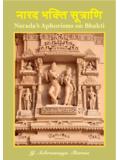
![Taittiriya Upanishad [Sanskrit-English]](/cache/preview/6/2/9/f/4/c/7/b/thumb-629f4c7b56764b8959c1313a86ab6236.jpg)


